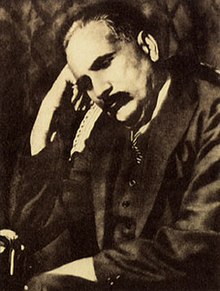From Wikipedia, the free encyclopedia
For other people named Muhammad Iqbal, see Muhammad Iqbal (disambiguation).
| Allama Muhammad Iqbal علامہ محمد اقبال | |
|---|---|
 | |
| Born | Muhammad Iqbal محمد اقبال 9 November 1877 Sialkot, Punjab, British India(now Pakistan) |
| Died | 21 April 1938 (aged 60) Lahore, Punjab, British India (now Pakistan) |
| Other names | Allama Iqbal |
| Era | 20th-century philosophy |
| Region | British India |
Main interests
| Urdu poetry, Persian poetry |
Notable ideas
| Two-nation theory, Conception of Pakistan |
| Website | |
| Allama Iqbal | |
Sir Muhammad Iqbal (Urdu: محمد اقبال) (9 November 1877 – 21 April 1938), widely known as Allama Iqbal (علامہ اقبال), was a philosopher,poet, mystic and politician[1] in British India who is widely regarded as having inspired the Pakistan Movement. He is considered one of the most important figures in Urdu literature,[2] with literary work in both the Urdu and Persian languages.[1][2] His grandparents were Kashmiri Pandits, the Brahmins of the Sapru clan from Kashmir who converted to Islam. Iqbal often mentioned and commemorated about his Kashmiri Pandit Brahmin lineage in his writings.[3]
Iqbal is admired as a prominent classical poet by Pakistani, Indian, Iranian, and other international scholars of literature.[4][5] Though Iqbal is best known as an eminent poet, he is also a highly acclaimed "Muslim philosophical thinker of modern times".[1][5] His first poetry book, Asrar-e-Khudi, appeared in the Persian language in 1915, and other books of poetry include Rumuz-i-Bekhudi, Payam-i-Mashriq and Zabur-i-Ajam. Amongst these his best known Urdu works are Bang-i-Dara, Bal-i-Jibril, Zarb-i Kalim and a part of Armughan-e-Hijaz. [6] In Iran andAfghanistan, he is famous as Iqbāl-e Lāhorī (اقبال لاهوری) (Iqbal of Lahore), and his poetry enjoys immense popularity among the masses, as well as strong support from ideologues of the Iranian Revolution.[7][8] Along with his Urdu and Persian poetry, his various Urdu and English lectures and letters have been very influential in cultural, social, religious and political disputes over the years.[6]
In 1922, he was knighted by King George V,[8][9] giving him the title "Sir".[10] While studying law and philosophy in England, Iqbal became a member of the London branch of the All India Muslim League.[5][6] Later, in one of his most famous speeches, Iqbal pushed for the creation of a Muslim state in Northwest India. This took place in his presidential speech in the League's December 1930 session.[5][6]
In much of Southern Asia and Urdu speaking world, Iqbal is regarded as the Shair-e-Mashriq (شاعر مشرق, "Poet of the East").[3][11][12] He is also called Mufakkir-e-Pakistan (مفکر پاکستان, "The Thinker of Pakistan") and Hakeem-ul-Ummat (حکیم الامت, "The Sage of the Ummah"). The Pakistan government officially named him a "national poet".[5] His birthday Yōm-e Welādat-e Muḥammad Iqbāl (یوم ولادت محمد اقبال) or (Iqbal Day) is apublic holiday in Pakistan.[13] In India he is also remembered as the author of Anthem of the People of Hindustan Saare Jahaan Se Achcha.[14]

No comments:
Post a Comment